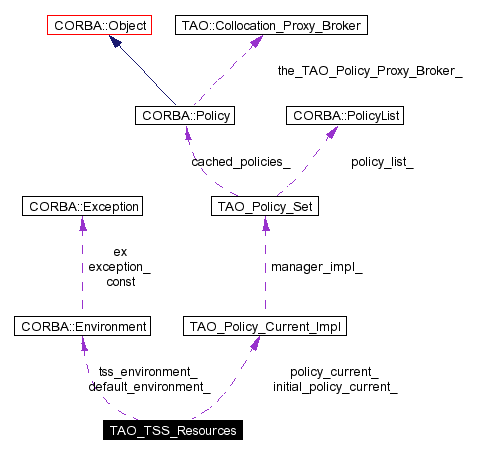
#include <TSS_Resources.h>
Collaboration diagram for TAO_TSS_Resources:

Public Methods | |
| TAO_TSS_Resources (void) | |
| Constructor. | |
| ~TAO_TSS_Resources (void) | |
| Destructor. | |
Public Attributes | |
| void * | poa_current_impl_ |
| void * | rtscheduler_current_impl_ |
| void * | rtscheduler_previous_current_impl_ |
| CORBA::Environment * | default_environment_ |
| The default environment for the thread. | |
| CORBA::Environment | tss_environment_ |
| TAO_Policy_Current_Impl | initial_policy_current_ |
| TAO_Policy_Current_Impl * | policy_current_ |
| This pointer is reset by the POA on each upcall. | |
Private Methods | |
Template methods | |
| TAO_TSS_Resources (const TAO_TSS_Resources &) | |
| void | operator= (const TAO_TSS_Resources &) |
This class is used by TAO to store the resources that are thread-specific but are *not* ORB specific. The members are public because only the ORB Core is expected to access them.
|
|
Constructor.
|
|
|
Destructor.
|
|
|
|
|
|
|
|
|
The default environment for the thread.
|
|
|
The initial PolicyCurrent for this thread. Should be a TSS resource. |
|
|
Points to structure containing state for the current upcall context in this thread. Note that it does not come from the resource factory because it must always be held in thread-specific storage. For now, since TAO_ORB_Core instances are TSS singletons, we simply ride along and don't allocate occupy another TSS slot since there are some platforms where those are precious commodities (e.g., NT). |
|
|
This pointer is reset by the POA on each upcall.
|
|
|
|
|
|
|
|
|
If the user (or library) provides no environment the ORB_Core still holds one. |
 1.2.18
1.2.18